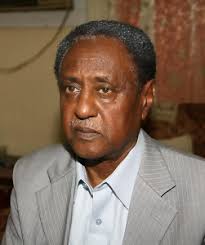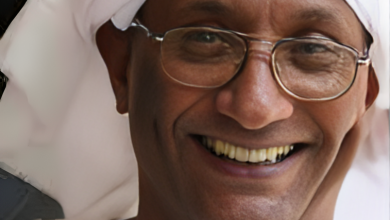Mahjoub Mohammed Saleh…. Visual Memory Even in Old Age (1-3)
The Last Pyramids of Journalism Passes Away

By: Siddiq Mohesi
Mahjoub Mohammad Saleh was born on April 12, 1928, in Hillat Hamad, Khartoum Bahri, from a family that worked in river transportation. The railway line built by the British ended in this city, but the Blue Nile Bridge was not built and opened until the year 1910, and thus Khartoum Bahri became a transportation center when it ended the railway line, and river transport begins from it, and thus it became a modern commercial center. Its importance was increased by the transfer of the British administration to the river transport department, so the city of Bahri was established as an extension of two ancient neighborhoods: Hillat Hamad, named after the Jurist Hamad Wad Maryum, and the Qubbat Khojali neighborhood, named after the other jurist, Khojali Abu Al- Jazz. The residents of both neighborhoods practiced agriculture, which was the prevailing profession at that time.
Mahjoub narrates in a recording I made with him in 2009 while he was on a visit to Doha.
Bahri had a modern character due to the presence of British government interests, a pastoral character linked to agriculture, and another linked to industry. Mahjoub completed the primary and intermediate stages in Khartoum Bahri and moved to Gordon College, which had a secondary level, as the British sought to prepare outstanding students to benefit from them in the administrative, clerical, and accounting corps. Mahjoub joined the Sudanese National Liberation Movement, abbreviated “Bhassedtu,” at the end of 1946, where he carried out his political activity against the British administration. Bhassedtu then turned to the anti-colonial front and then to the Sudanese Communist Party. In 1947, he joined the College of Arts, and in 1948, he was elected deputy secretary of the University College Student Union Committee and became secretary in 1949. For his leadership of a student strike, Mahjoub was dismissed along with his two late leftist colleagues, Mustafa Al-Sayed, and Al-Taher Abdul Basset from the college.
Coincidence led to the appointment of Jamal Mohammed Ahmed as the first dean of student affairs at Khartoum University College. He pledged to Mahjoub to return him again to the college to continue his studies, but Mahjoub apologized for returning and told Jamal that he wanted to work in journalism, and here Jamal indicated to him that if that was the case, then Mohammed Ibrahim Khalil had left the English newspaper “Sudan Star”, and Bashir Mohammed Saeed was sent on a mission to Britain for a journalistic course. There was an opportunity to work in it, and he advised him to go to the newspaper “Sudan Star” perhaps he would find an opportunity there. Indeed, Mahjoub was chosen to work in the English newspaper, and at the same time Ahmed Youssuf Hashem chose him to work with him in Al-Sudan Al-Jadeed Arabic newspaper, and in the two newspapers his journalistic talent was strengthened, so he gained experience in two fields of the profession, both in Arabic and English. In English, he was trained first by the British editor-in-chief, Mr. Hislop, then by the editor-in-chief, Jack Hoebler, secondly. And in Arabic, by the father of newspapers, Ahmed Youssuf Hashem, who worked as a journalist in Egypt and Sudan since the 1930s. Armed with Egyptian journalistic experience, Mahjoub’s desire at first was to work as a teacher, as education had a special luster that attracted learners from that generation to it. Indeed, he sought to work in private schools, so he was chosen as a teacher in Al-Fasher School, then Al-Obeid, but the British authorities returned him twice from the railway station, fearing that he would spread the infection of the leftist opposition to the students.
Mahjoub sheds light on the fact that the year 1946 was an important year in the history of the Sudanese political movement, as three important events took place in it. The first was the travel of the first Sudanese delegation to Cairo to present Sudan’s vision for the future of the nation and its liberation from colonialism, by holding Egyptian-English talks around it, with the Sudan issue on its agenda. The second Egypt provided scholarships for Sudanese students. Thus, the enrollment of Sudanese students in Egyptian universities became a legitimate act after they had been sneaking in. The third was the British administration’s decision to transform Gordon College into a university college, and then the establishment of the first Marxist movement in Sudan. These three events gave a strong impetus to political work, which was accompanied by great vitality in journalistic life.
In the Sudan Standard newspaper, Mahjoub met the late Bashir Mohamed Saeed, who preceded him in the profession by four years. However, they bonded and walked together through trouble for many years.
Bashir suggested to us, Mahjoub Osman and me, that we publish a private daily newspaper that would be characterized by professionalism and boldness and introduce a new type of journalism. It was a good idea, but they did not have money!! “Al-Ayyam” was in the year 1953, that is, four years after I joined journalism.
Bashir Al-Hawi
Mahjoub tells the story of the Al-Ayyam of how it was an idea and then turned into an integrated project later. He says, after we received the approval, we decided to buy a quantity of lead letters for the manual row and an old, primitive printing press from Egypt for a small sum, and we rented a site for it in the old Abu Al-Ela building, near the independent newspapers building. The workers were collecting the pages are manually stacked in an iron mold, then the mold is tied with a strong thread so that the next stage is the printing stage. We did not receive salaries from the newspaper because its income was not sufficient at the beginning of the work, and we relied on the wages that came to us from our foreign press correspondence, as Bashir was a correspondent for the news agency. Arabic “Asharq Al-Awsat” Later, I was a correspondent for Reuters and Mahjoub Osman was a correspondent for Associated Press. This is how Al-Ayyam began its long journey.
Mahjoub narrates that one day, Bashir was on a mission to buy printing paper from the Barsamian Company in Khartoum, he met there with a representative from the British company that produces Linotype automatic stacking machines, and he agreed with him to buy an automatic grading machine in installments. He did not know where to provide this amount from, but with his exceptional and distinguished effort, we were able to pay the installments for the first Linotype collection machine owned by a private newspaper, which was considered a qualitative leap in the world of Sudanese journalism at that time. After that, Bashir brought a used printing machine during his visit to Egypt. This was a huge leap in the printing of Sudanese newspapers at that time. Al-Ayyam’s production format improved and the speed of printing increased. This led to an increase in distribution until we surpassed the public opinion that was controlling the scene
Al-Ayyam in the morning
In a bold step, we decided to go against other newspapers and publish Al-Ayyam in the morning instead of in the evening, as all newspapers were in the evening and employees bought newspapers on their way to their homes. So we changed the verse so that employees bought newspapers on their way to their work, and thus Al-Ayyam was the first Sudanese newspaper to be published in the morning.
Mahjoub says, “I started journalism at the bottom of the ladder and got involved in field work as it was necessary for any journalist of my age to do. After I got involved in the political community and expanded my circle of political and social sources, I was sent in 1952 to Britain with a scholarship from the British Council to spend a six-month journalistic course in the Daily Express newspaper and some regional newspapers, and this was the first step in gaining international experience.
I returned from Britain to apply what I had learned from the arts of journalism, especially accuracy in publishing the news and its elements, which were not known in the Sudanese press. Thus, I got rid of the constructive language in formulating the news, relying on directness in reaching the meaning. There, I also learned how news is transformed into a journalistic investigation, and the difference between the personal interview and the journalistic investigation.
Mahjoub denied that Al-Ayyam was run in three ways: the right was represented by Bashir Mohammed Saeed, the left was represented by Mahjoub Osman, and the middle was represented by him. He said that from the beginning of the partnership, it was agreed that the newspaper would be completely independent and that each of the partners would express the opinion he believed in in his own column, and we indeed were belonging to different schools of thought. Bashir was inclined to the Independence Front and stood against the unity of the Nile Valley, close to the Umma Party, and a personal friend of Mr. Abdul Rahman Al Mahdi, the Patron of the Ansar. As for Mahjoub Osman, he was a unionist and was the secretary of the Unionists Party in Port Sudan. He was tried and imprisoned for leading demonstrations against the Legislative Assembly. He was fired from his job before he joined the Sudanese Communist Party. As for me, I was a leftist who joined the Sudanese National Liberation Movement, the first Marxist organization in Sudan. Mahjoub goes on to say that what distinguished Al-Ayyam from other newspapers in terms of news was its benefit from its friends who provided it with news from time to time. Among them are Daoud Abdul Latif, Jamal Mohammed Ahmed, Mohammed Omar Bashir, and Fakhr Al-Din Mohammed.
In this way, Al-Ayyam was run as an independent newspaper in its editorial line, and not independent in the positions and opinions of its owners. Our definition of independence was the non-alignment of (the newspaper) as an institution to any political party, but its editors were free in their political choices, committed to the credibility and professionalism of the news, and not (neutral) towards national issues.



